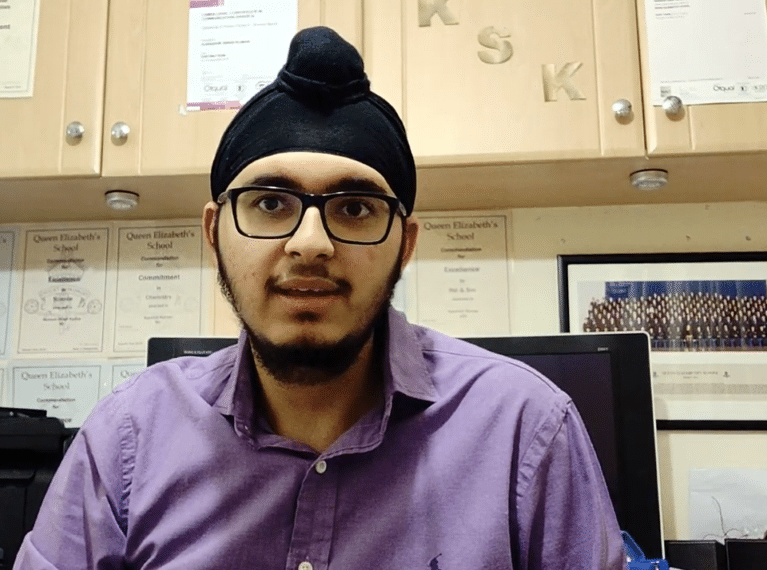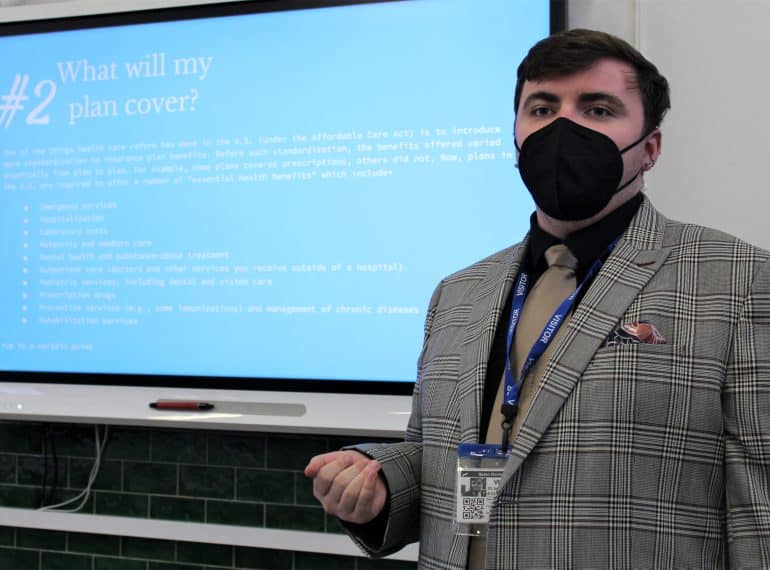
Three interns from the University of Connecticut helped deepen boys’ knowledge of American healthcare at a meeting of QE’s Personal Finance Society.
Pupils heard about the high costs and complexity inherent in the US system, with the session ending in a discussion of the pros and cons of healthcare on both sides of the Atlantic.
The meeting was organised by Ugan Pretheshan, who runs the society along with fellow Year 11 pupil Roshan Patel with the aim of helping boys manage their finances both now and in the future in their adult lives. Other topics covered in its meetings include buying a house and maintaining a good credit score.
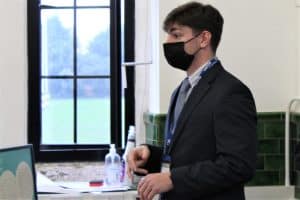 Headmaster Neil Enright said: “I am grateful to our three current interns, Evan Burns, Nathaniel Austin-Mathley, and Ben Duncan, for their contribution to this meeting and to our enrichment programme more generally. Our relationship with the University of Connecticut extends back over a number of years and it is great that we can again welcome interns this year. It is a connection which gives us fascinating insights into the differences in pedagogy and educational culture between our respective countries.
Headmaster Neil Enright said: “I am grateful to our three current interns, Evan Burns, Nathaniel Austin-Mathley, and Ben Duncan, for their contribution to this meeting and to our enrichment programme more generally. Our relationship with the University of Connecticut extends back over a number of years and it is great that we can again welcome interns this year. It is a connection which gives us fascinating insights into the differences in pedagogy and educational culture between our respective countries.
“Their presence allows boys here to more readily make international comparisons and to understand different contexts and policy approaches: the opportunity thus to interrogate a different system is valuable, not least in helping pupils think critically about our own systems.”
“I congratulate Ugan and Roshan on their work with the society: like other pupil-run societies, it is of great benefit both to those who lead it and to those who attend. The Personal Finance Society complements the work of my colleagues who teach topics such as personal finance and other life skills through formal programmes of study, such as QE’s Personal Development Time programme.”
During the meeting, which was overseen by Economics teacher Sheerwan O’Shea-Nejad, the three History interns spoke extensively on American healthcare, telling the boys that it is a complex system that leaves many suffering, both physically and financially.
US healthcare spending grew 9.7 per cent in 2020, they said, reaching $4.1 trillion, or $12,530 per person. As a share of the nation’s Gross Domestic Product, health spending accounted for 19.7 per cent.
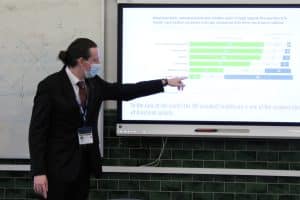 “It was eye-opening to understand the complex and diverse methods of insurance and financing these large hospital bills,” said Ugan. The boys attending learned that insurance companies dominate US healthcare industries, presenting American citizens with a welter of quotation pathways and options – encompassing premiums, walk-in fees and ‘deductibles’ – that can be very difficult to understand. The contrast with the relative simplicity achieved by the NHS system in the UK was highlighted.
“It was eye-opening to understand the complex and diverse methods of insurance and financing these large hospital bills,” said Ugan. The boys attending learned that insurance companies dominate US healthcare industries, presenting American citizens with a welter of quotation pathways and options – encompassing premiums, walk-in fees and ‘deductibles’ – that can be very difficult to understand. The contrast with the relative simplicity achieved by the NHS system in the UK was highlighted.
The meeting also heard a story about what a woman who had got her leg caught between a train and the platform in the US told onlookers: “Don’t call an ambulance. It’s $3,000. I can’t afford that. Call an ‘Uber’.”
Asked what they would do in such a medical emergency in the UK, the boys responded that they would not hesitate to call an ambulance.
The interns, who are supporting the History, Politics and Religious Studies departments this term as part of their Master’s programme, happily answered boys’ questions, before the meeting concluded with a weighing-up of the advantages and disadvantages of both systems, with arguments about price, accessibility and waiting times all factors in the debate.

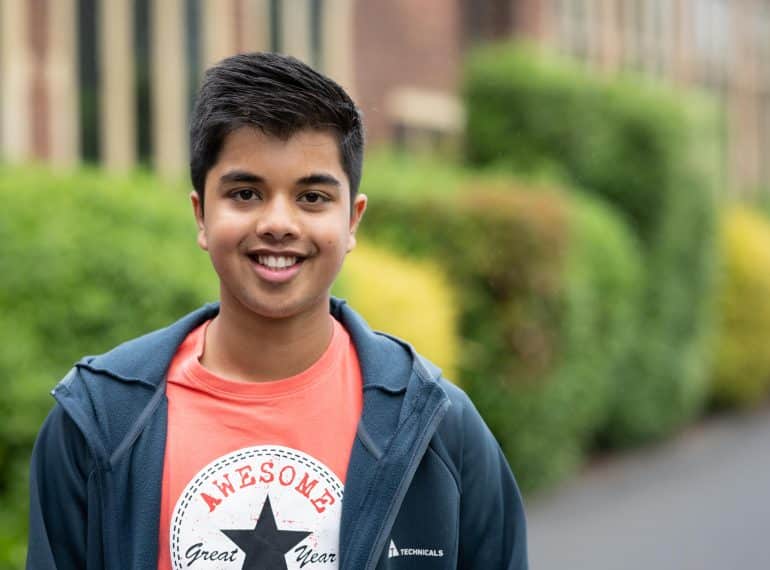
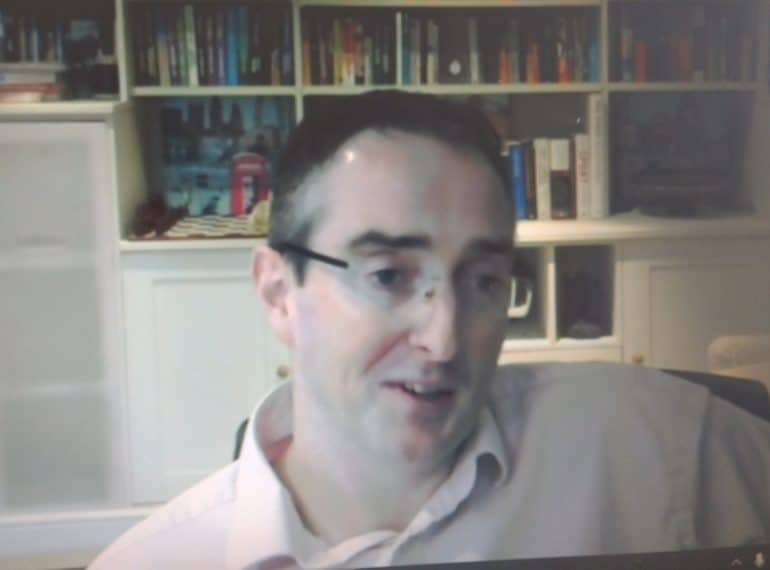
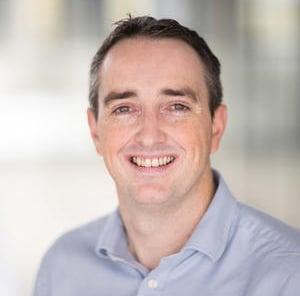 The speaker, Michael McMahon, Professor of Economics at the University of Oxford and Senior Research Fellow at St Hugh’s College, is a leading expert on communications in central banks. His interests also lie in monetary economics, fiscal policy, business cycles, and applied econometrics. He worked at the Bank of England for many years and now serves as a member of the Irish Fiscal Advisory Council.
The speaker, Michael McMahon, Professor of Economics at the University of Oxford and Senior Research Fellow at St Hugh’s College, is a leading expert on communications in central banks. His interests also lie in monetary economics, fiscal policy, business cycles, and applied econometrics. He worked at the Bank of England for many years and now serves as a member of the Irish Fiscal Advisory Council.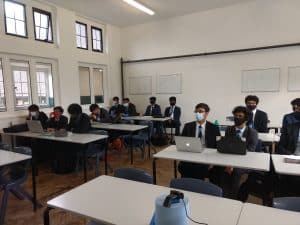 “They were particularly attentive to the portions of Professor McMahon’s lecture in which he laid emphasis on how the current economic situation will impact young people as they are thinking about their job prospects for the future.
“They were particularly attentive to the portions of Professor McMahon’s lecture in which he laid emphasis on how the current economic situation will impact young people as they are thinking about their job prospects for the future.
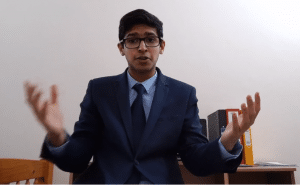 Abir Mohammed, Dhruv Syam and Ansh Jassra put together a polished three-minute film featuring footage from around the world on the competition theme of The changing workplace: same spaces, new realities. The 2020 competition, entitled Bank Camera, Action, challenged entrants to explore the effects of the coronavirus pandemic on the way we work, on jobs and on the economy.
Abir Mohammed, Dhruv Syam and Ansh Jassra put together a polished three-minute film featuring footage from around the world on the competition theme of The changing workplace: same spaces, new realities. The 2020 competition, entitled Bank Camera, Action, challenged entrants to explore the effects of the coronavirus pandemic on the way we work, on jobs and on the economy. QE teacher of Economics Krishna Shah said: “I am extremely proud of the three of them and delighted that all their hard work in putting the film together has been rewarded.”
QE teacher of Economics Krishna Shah said: “I am extremely proud of the three of them and delighted that all their hard work in putting the film together has been rewarded.”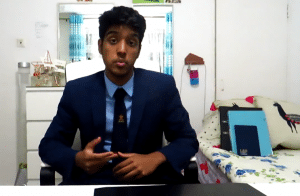 It considered the environmental benefits of reduced levels of commuting and outlined possible technological solutions to the difficulties in maintaining work-life balance that working from home often entails, such as using separate electronic devices for work and personal life and screen-time blocking apps.
It considered the environmental benefits of reduced levels of commuting and outlined possible technological solutions to the difficulties in maintaining work-life balance that working from home often entails, such as using separate electronic devices for work and personal life and screen-time blocking apps. “Ultimately, the question is not whether remote working is here to stay, but to what extent.
“Ultimately, the question is not whether remote working is here to stay, but to what extent.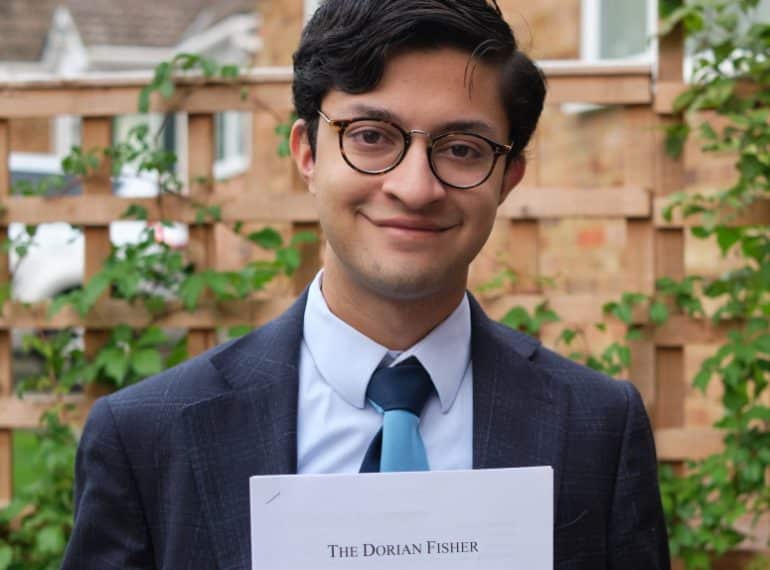
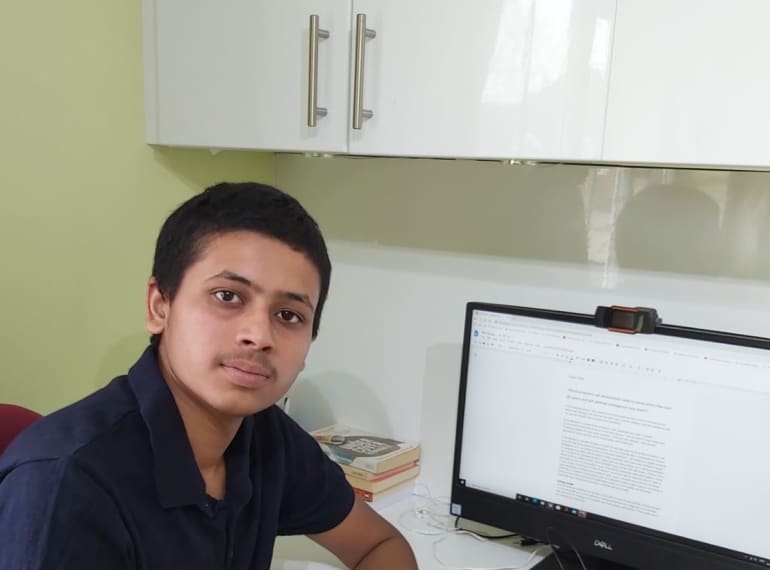
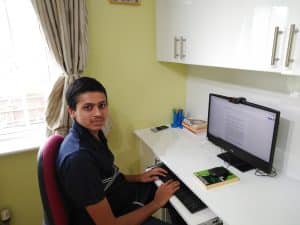 His 1,500-word composition won him the Economics section – and a £1,000 prize – in the annual New College of the Humanities Essay Competition.
His 1,500-word composition won him the Economics section – and a £1,000 prize – in the annual New College of the Humanities Essay Competition.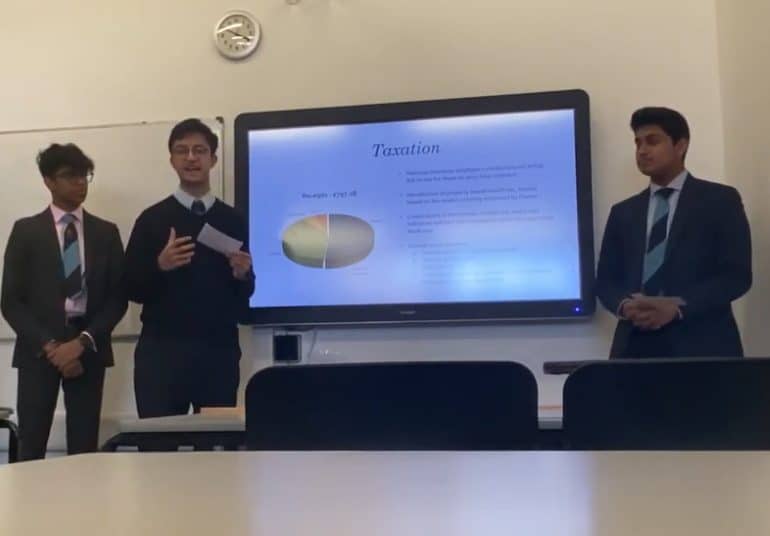
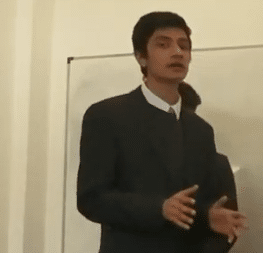 They talked about the impact that the Covid-19 virus has had on the British and world economies, and reflected on how they had had to be responsive in their thinking: “We have had to significantly adapt our original budget,” said Thapan, while Tanishq spoke of the need to supply long-term, sustainable, investment for the NHS in addition to a short-term aid package.
They talked about the impact that the Covid-19 virus has had on the British and world economies, and reflected on how they had had to be responsive in their thinking: “We have had to significantly adapt our original budget,” said Thapan, while Tanishq spoke of the need to supply long-term, sustainable, investment for the NHS in addition to a short-term aid package.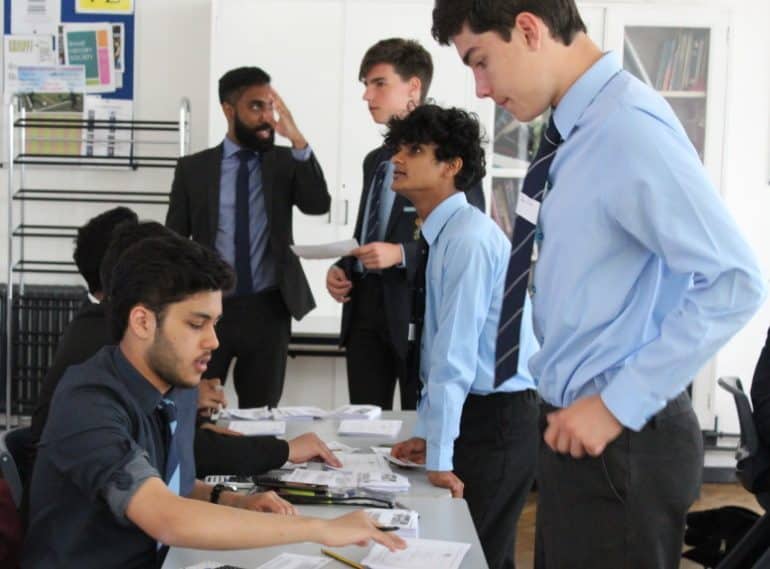
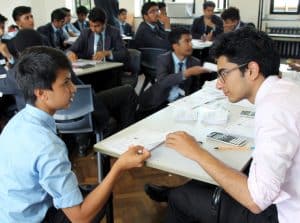 Economics teacher Krishna Shah said: “This was a great alternative to normal Economics lessons, and the boys appreciated getting away from ‘boring’ essay-writing! The morning gave them an opportunity to experience the pressure of a real trading floor and apply their understanding of supply and demand to a real-life situation. Not only did they gain an insight into the atmosphere of a real trading floor, but they also developed skills such as teamwork, analytical thinking, leadership, decision-making and risk management.
Economics teacher Krishna Shah said: “This was a great alternative to normal Economics lessons, and the boys appreciated getting away from ‘boring’ essay-writing! The morning gave them an opportunity to experience the pressure of a real trading floor and apply their understanding of supply and demand to a real-life situation. Not only did they gain an insight into the atmosphere of a real trading floor, but they also developed skills such as teamwork, analytical thinking, leadership, decision-making and risk management.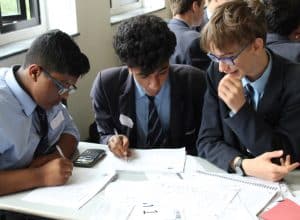 The boys could buy and sell shares in nine companies and also buy the dollar. They had to make decisions about which companies would increase in market value and which would lose out, based on media reports from newspaper, radio and TV briefings.
The boys could buy and sell shares in nine companies and also buy the dollar. They had to make decisions about which companies would increase in market value and which would lose out, based on media reports from newspaper, radio and TV briefings.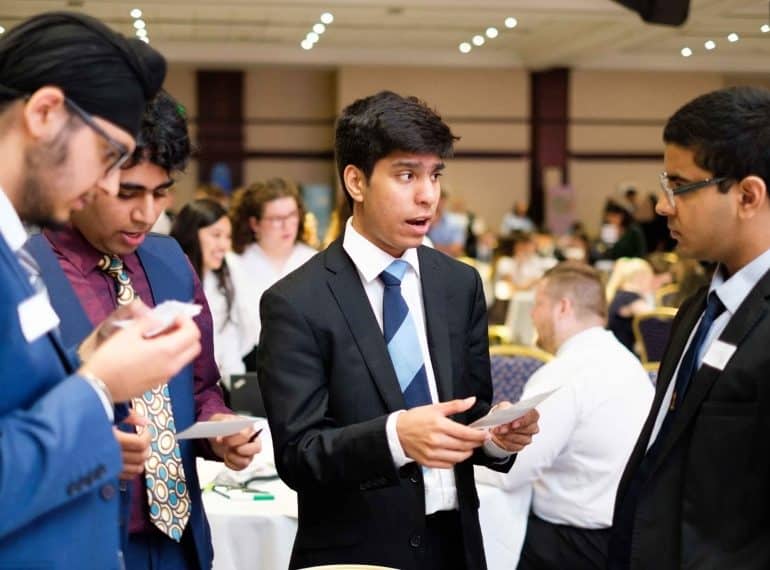
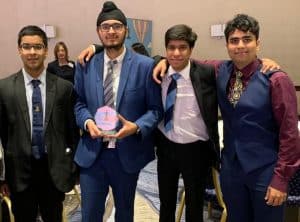 Karanvir Singh Kumar, Yash Shah, Harshil Shah and Manas Madan competed alongside 47 other school teams at the final of the BASE competition run by ICAEW (Institute of Chartered Accountants in England and Wales) in Birmingham.
Karanvir Singh Kumar, Yash Shah, Harshil Shah and Manas Madan competed alongside 47 other school teams at the final of the BASE competition run by ICAEW (Institute of Chartered Accountants in England and Wales) in Birmingham.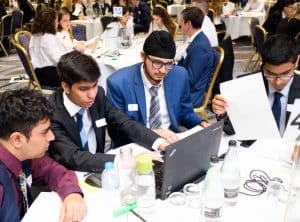 Team leader Karanvir said: “We had to consider how we would finance the venture and which sponsor we would choose. Throughout our analysis we also had to consider ethics and demonstrate integrity – key qualities of Chartered Accountants.”
Team leader Karanvir said: “We had to consider how we would finance the venture and which sponsor we would choose. Throughout our analysis we also had to consider ethics and demonstrate integrity – key qualities of Chartered Accountants.”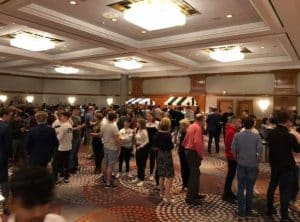 Although they QE did not win the overall title, they did take the trio of additional prizes.
Although they QE did not win the overall title, they did take the trio of additional prizes.